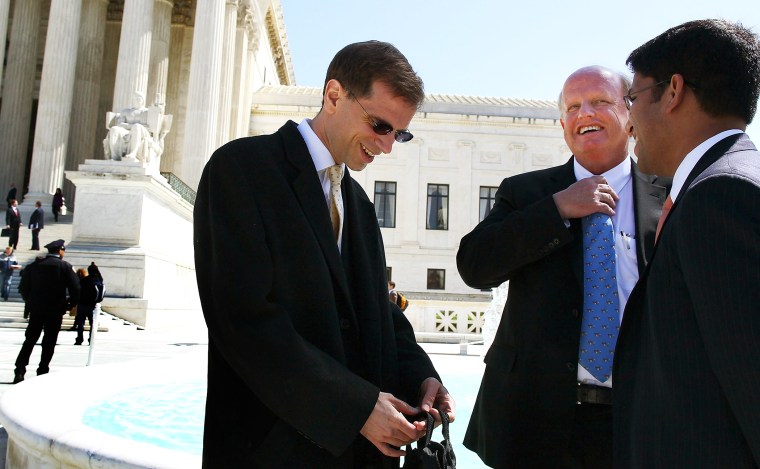Congressional Republicans have voted 46 times to repeal Obamacare, and they spent Tuesday vowing repeal yet again. But even as the war of words heated up on Capitol Hill, a more immediate threat to the law was unfolding just down the street: The same lawyer who challenged Obamacare before the Supreme Court was asking a federal judge to blow a gaping hole through the statute by invalidating most of its tax subsidies.
Lawyer Michael Carvin, arguing for the plaintiffs in Halbig v. Sebelius, told Judge Paul Friedman that Congress wrote the Affordable Care Act in a way that makes tax subsidies available only in 14 states. The Obama administration now wants to offer subsidies in all 50 states to help lower-income Americans afford insurance. But it can’t do so, Carvin argued, without “rewriting the statute.”
A Justice Department lawyer fought right back during the two-hour hearing, arguing that Carvin’s position “defies common sense.”
Friedman didn’t signal which way he will rule. But he has said he’ll issue a decision one way or the other by February. And the outcome may well be as important to Obamacare’s future as anything happening on the Hill.
That’s because tax subsidies are a crucial piece of the Affordable Care Act -- indeed, it’s no exaggeration to say they give the Act its name. The subsidies are tax credits for lower-income Americans who buy insurance through Obamacare exchanges. They’re designed to reduce, in some cases dramatically, the price of coverage -- a price tag many otherwise could not afford.
But Carvin, arguing on behalf of a collection of challengers, thinks he has found a wrinkle in the statute that makes those subsidies unavailable in 36 states.
The issue boils down to the meaning of four words in the massive statute. The Affordable Care Act calls for each state to set up an exchange. But, recognizing that some states might refuse, the law also says the federal government must take on that task in any state that drags its feet.
That’s where the technicality crops up. When Congress drafted the tax-subsidy section of the law, it wrote that applicants are eligible for subsidies if they enroll in insurance through an exchange “established by the state.” And 36 states do not have exchanges established by a state. Instead, they have exchanges established by the federal government, because the state didn’t take action.
Carvin argued Tuesday that that means residents in those 36 states can’t get the tax credits designed to make coverage more affordable. What’s more, Carvin claimed, Congress actually wanted it that way: He told a skeptical Friedman that Congress intentionally limited subsidies to states with their own exchanges as an incentive to get states to create exchanges in the first place.
“Sure, Congress obviously wanted subsidies in every state,” he said. “But it wanted something else. It wanted states to run it.”
The Obama administration, he argued, is flaunting Congress’s incentive scheme by trying to give out subsidies even in states that didn’t do the work. He said the administration is “giving them all the goodies without requiring any sacrifice.”
Carvin, known for his animated arguments, was in full flower Tuesday, pounding the podium and gesticulating as he spoke. Department of Justice lawyer Joel McElvain, arguing second, took a quieter approach -- but that didn’t stop him from disagreeing vehemently with just about everything Carvin had said.
McElvain argued that Carvin had made up the supposed incentive scheme out of whole cloth. In fact, he said, Congress “just did not have the purpose that plaintiffs ascribe to it.” Instead, he argued, Congress set out to make tax credits “available in every state.”
As for the argument about the words “established by the state,” McElvain said Carvin’s focus was too narrow. “You have to look at the overall structure of the Act,” he said, and if you do so it becomes clear that Carvin’s interpretation can’t be right. Among other things, he told the court, Carvin’s interpretation wreaks havoc with other parts of the law by making them unworkable.
“Our reading makes sense of the whole Act, read together,” he told Friedman. “Their reading does not.”
The argument, while heated at times, was technical. The potential impacts are anything but. The Congressional Budget Office has estimated that within a decade, 20 million Americans will need subsidies to buy insurance through the exchanges. And nearly three-quarters of them live in states with federally-run exchanges -- states where, according to the plaintiffs, subsidies aren’t available.
If the plantiffs win, Obamacare enrollment could be cut off at the knees.
Dominic Perella is a lawyer at Hogan Lovells LLP in Washington, D.C. He authored a friend-of-the-court brief in the Halbig case, arguing in favor of the government’s position.
